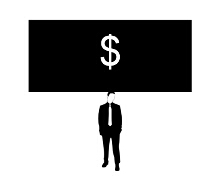Financial Tips for Small Business Owners

As a small business owner you have to manage the business finances, handle the marketing and gaining of new clients, the staff ... and so on! Then somehow you have to manage your personal finances as well. For many small business owners it gets difficult to separate the business from the personal finances, but these tips will help.
Budget: It is simple, and boring, but it is the best thing in the world to help plan your business and your own finances. Work out what is needed for each, and where the money should be going, and that will give you a plan even if you don't have a business plan. Think especially about these areas when doing budgeting:
- The money you have in reserve and savings – and how much you would like that to be in the future.
- Known, or fixed, costs
- The variable expenses: areas where you'd like to spend money, if you have it.
- The revenue that you need to break even and make the business stay in business
- Your desirable profit level
Income Taxes: Make sure that you are putting funds aside for tax. It is one of the biggest areas of small business financial stress ... not having tax money ready at the right time. So put aside some of the income all the time into a separate tax account, preferably one that earns interest.
Avoid Impulsive Spending: Think of the budget... the plan! The point of budgeting is to plan where you should spend – not to stop you doing anything else, but just where you should spend. Sometimes it is a great decision to do something that wasn't first thought of in the budget, so the budget doesn't control everything. If your impulse to spend wasn't in the budget though, you do need to think carefully about whether the extra spending adds value, or a new stress?
Keep your personal and business accounts separate: Apart from the desire to try and protect your personal financial position from the risks of business, it is very important from a tax planning perspective to keep business and personal funds separated.
Prepare for a Cashflow Crisis: No matter how well you plan, and how prudent and sensible you are as a small business owner, something will go wrong sometime. The biggest client leaves ... tax rates change ... some new technology threatens your core offering... the smart business owner prepares for a cash crisis properly. While it is a lot less stressful if you have cash reserves built up that you can rely upon to buy you time, preparing for a cashflow crisis might be as simple as ensuring you have guaranteed funding (e.g. overdrafts) or personal investments built up that could be used as a new capital into your own business.
It is an awful lot easier to arrange an overdraft with your bank when you don't need it than it is when you do.
- Last updated on .